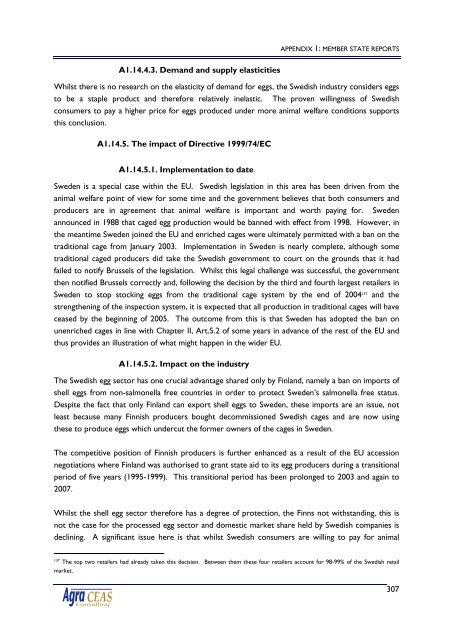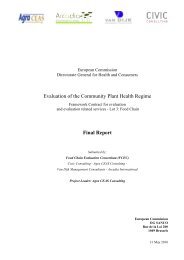- Page 1:
Study on thesocio-economic implicat
- Page 4 and 5:
THE SOCIO-ECONOMIC IMPLICATIONS OF
- Page 7 and 8:
THE SOCIO-ECONOMIC IMPLICATIONS OF
- Page 9:
THE SOCIO-ECONOMIC IMPLICATIONS OF
- Page 12 and 13:
THE SOCIO-ECONOMIC IMPLICATIONS OF
- Page 14 and 15:
THE SOCIO-ECONOMIC IMPLICATIONS OF
- Page 16 and 17:
THE SOCIO-ECONOMIC IMPLICATIONS OF
- Page 18 and 19:
THE SOCIO-ECONOMIC IMPLICATIONS OF
- Page 20 and 21:
THE SOCIO-ECONOMIC IMPLICATIONS OF
- Page 22 and 23:
THE SOCIO-ECONOMIC IMPLICATIONS OF
- Page 24 and 25:
THE SOCIO-ECONOMIC IMPLICATIONS OF
- Page 26 and 27:
THE SOCIO-ECONOMIC IMPLICATIONS OF
- Page 28 and 29:
THE SOCIO-ECONOMIC IMPLICATIONS OF
- Page 30 and 31:
THE SOCIO-ECONOMIC IMPLICATIONS OF
- Page 32 and 33:
THE SOCIO-ECONOMIC IMPLICATIONS OF
- Page 34 and 35:
THE SOCIO-ECONOMIC IMPLICATIONS OF
- Page 36 and 37:
THE SOCIO-ECONOMIC IMPLICATIONS OF
- Page 38 and 39:
THE SOCIO-ECONOMIC IMPLICATIONS OF
- Page 41 and 42:
THE SOCIO-ECONOMIC IMPLICATIONS OF
- Page 43 and 44:
THE SOCIO-ECONOMIC IMPLICATIONS OF
- Page 45 and 46:
THE SOCIO-ECONOMIC IMPLICATIONS OF
- Page 47 and 48:
THE SOCIO-ECONOMIC IMPLICATIONS OF
- Page 49 and 50:
THE SOCIO-ECONOMIC IMPLICATIONS OF
- Page 51 and 52:
THE SOCIO-ECONOMIC IMPLICATIONS OF
- Page 53 and 54:
THE SOCIO-ECONOMIC IMPLICATIONS OF
- Page 55 and 56:
THE SOCIO-ECONOMIC IMPLICATIONS OF
- Page 57 and 58:
THE SOCIO-ECONOMIC IMPLICATIONS OF
- Page 59 and 60:
THE SOCIO-ECONOMIC IMPLICATIONS OF
- Page 61 and 62:
THE SOCIO-ECONOMIC IMPLICATIONS OF
- Page 63 and 64:
THE SOCIO-ECONOMIC IMPLICATIONS OF
- Page 65 and 66:
THE SOCIO-ECONOMIC IMPLICATIONS OF
- Page 67 and 68:
THE SOCIO-ECONOMIC IMPLICATIONS OF
- Page 69 and 70:
THE SOCIO-ECONOMIC IMPLICATIONS OF
- Page 71 and 72:
THE SOCIO-ECONOMIC IMPLICATIONS OF
- Page 73:
THE SOCIO-ECONOMIC IMPLICATIONS OF
- Page 76 and 77:
THE SOCIO-ECONOMIC IMPLICATIONS OF
- Page 78 and 79:
THE SOCIO-ECONOMIC IMPLICATIONS OF
- Page 80 and 81:
THE SOCIO-ECONOMIC IMPLICATIONS OF
- Page 82 and 83:
THE SOCIO-ECONOMIC IMPLICATIONS OF
- Page 84 and 85:
THE SOCIO-ECONOMIC IMPLICATIONS OF
- Page 87 and 88:
THE SOCIO-ECONOMIC IMPLICATIONS OF
- Page 89:
THE SOCIO-ECONOMIC IMPLICATIONS OF
- Page 92 and 93:
THE SOCIO-ECONOMIC IMPLICATIONS OF
- Page 94 and 95:
THE SOCIO-ECONOMIC IMPLICATIONS OF
- Page 96 and 97:
THE SOCIO-ECONOMIC IMPLICATIONS OF
- Page 98 and 99:
THE SOCIO-ECONOMIC IMPLICATIONS OF
- Page 100 and 101:
THE SOCIO-ECONOMIC IMPLICATIONS OF
- Page 102 and 103:
THE SOCIO-ECONOMIC IMPLICATIONS OF
- Page 104 and 105:
THE SOCIO-ECONOMIC IMPLICATIONS OF
- Page 106 and 107:
THE SOCIO-ECONOMIC IMPLICATIONS OF
- Page 108 and 109:
THE SOCIO-ECONOMIC IMPLICATIONS OF
- Page 110 and 111:
THE SOCIO-ECONOMIC IMPLICATIONS OF
- Page 112 and 113:
THE SOCIO-ECONOMIC IMPLICATIONS OF
- Page 114 and 115:
THE SOCIO-ECONOMIC IMPLICATIONS OF
- Page 116 and 117:
THE SOCIO-ECONOMIC IMPLICATIONS OF
- Page 118 and 119:
THE SOCIO-ECONOMIC IMPLICATIONS OF
- Page 120 and 121:
THE SOCIO-ECONOMIC IMPLICATIONS OF
- Page 122 and 123:
THE SOCIO-ECONOMIC IMPLICATIONS OF
- Page 124 and 125:
THE SOCIO-ECONOMIC IMPLICATIONS OF
- Page 126 and 127:
THE SOCIO-ECONOMIC IMPLICATIONS OF
- Page 128 and 129:
THE SOCIO-ECONOMIC IMPLICATIONS OF
- Page 130 and 131:
THE SOCIO-ECONOMIC IMPLICATIONS OF
- Page 132 and 133:
THE SOCIO-ECONOMIC IMPLICATIONS OF
- Page 134 and 135:
THE SOCIO-ECONOMIC IMPLICATIONS OF
- Page 136 and 137:
THE SOCIO-ECONOMIC IMPLICATIONS OF
- Page 138 and 139:
THE SOCIO-ECONOMIC IMPLICATIONS OF
- Page 140 and 141:
THE SOCIO-ECONOMIC IMPLICATIONS OF
- Page 142 and 143:
THE SOCIO-ECONOMIC IMPLICATIONS OF
- Page 144 and 145:
THE SOCIO-ECONOMIC IMPLICATIONS OF
- Page 146 and 147:
THE SOCIO-ECONOMIC IMPLICATIONS OF
- Page 148 and 149:
THE SOCIO-ECONOMIC IMPLICATIONS OF
- Page 150 and 151:
THE SOCIO-ECONOMIC IMPLICATIONS OF
- Page 152 and 153:
THE SOCIO-ECONOMIC IMPLICATIONS OF
- Page 155 and 156:
THE SOCIO-ECONOMIC IMPLICATIONS OF
- Page 157 and 158:
THE SOCIO-ECONOMIC IMPLICATIONS OF
- Page 159 and 160:
THE SOCIO-ECONOMIC IMPLICATIONS OF
- Page 161 and 162:
THE SOCIO-ECONOMIC IMPLICATIONS OF
- Page 163 and 164:
THE SOCIO-ECONOMIC IMPLICATIONS OF
- Page 165 and 166:
THE SOCIO-ECONOMIC IMPLICATIONS OF
- Page 167 and 168:
THE SOCIO-ECONOMIC IMPLICATIONS OF
- Page 169 and 170:
THE SOCIO-ECONOMIC IMPLICATIONS OF
- Page 171 and 172:
THE SOCIO-ECONOMIC IMPLICATIONS OF
- Page 173 and 174:
THE SOCIO-ECONOMIC IMPLICATIONS OF
- Page 175 and 176:
THE SOCIO-ECONOMIC IMPLICATIONS OF
- Page 177 and 178:
THE SOCIO-ECONOMIC IMPLICATIONS OF
- Page 179 and 180:
THE SOCIO-ECONOMIC IMPLICATIONS OF
- Page 181 and 182:
THE SOCIO-ECONOMIC IMPLICATIONS OF
- Page 183 and 184:
THE SOCIO-ECONOMIC IMPLICATIONS OF
- Page 185 and 186:
THE SOCIO-ECONOMIC IMPLICATIONS OF
- Page 187 and 188:
THE SOCIO-ECONOMIC IMPLICATIONS OF
- Page 189 and 190:
THE SOCIO-ECONOMIC IMPLICATIONS OF
- Page 191 and 192:
THE SOCIO-ECONOMIC IMPLICATIONS OF
- Page 193 and 194:
THE SOCIO-ECONOMIC IMPLICATIONS OF
- Page 195 and 196:
THE SOCIO-ECONOMIC IMPLICATIONS OF
- Page 197 and 198:
THE SOCIO-ECONOMIC IMPLICATIONS OF
- Page 199 and 200:
THE SOCIO-ECONOMIC IMPLICATIONS OF
- Page 201 and 202:
APPENDIX 1: MEMBER STATE REPORTSA1.
- Page 203 and 204:
APPENDIX 1: MEMBER STATE REPORTSwhi
- Page 205 and 206:
APPENDIX 1: MEMBER STATE REPORTS3.0
- Page 207 and 208:
APPENDIX 1: MEMBER STATE REPORTSA1.
- Page 209 and 210:
APPENDIX 1: MEMBER STATE REPORTSTab
- Page 211 and 212:
APPENDIX 1: MEMBER STATE REPORTS765
- Page 213 and 214:
APPENDIX 1: MEMBER STATE REPORTS80%
- Page 215 and 216:
APPENDIX 1: MEMBER STATE REPORTSA1.
- Page 217 and 218:
APPENDIX 1: MEMBER STATE REPORTSwhe
- Page 219 and 220:
APPENDIX 1: MEMBER STATE REPORTSThe
- Page 221 and 222:
APPENDIX 1: MEMBER STATE REPORTS100
- Page 223 and 224:
APPENDIX 1: MEMBER STATE REPORTSTab
- Page 225 and 226:
APPENDIX 1: MEMBER STATE REPORTSA1.
- Page 227 and 228:
APPENDIX 1: MEMBER STATE REPORTS60%
- Page 229 and 230:
APPENDIX 1: MEMBER STATE REPORTSA1.
- Page 231 and 232:
APPENDIX 1: MEMBER STATE REPORTSTab
- Page 233 and 234:
APPENDIX 1: MEMBER STATE REPORTSAll
- Page 235 and 236:
APPENDIX 1: MEMBER STATE REPORTS60,
- Page 237 and 238:
APPENDIX 1: MEMBER STATE REPORTSTab
- Page 239 and 240:
APPENDIX 1: MEMBER STATE REPORTSA1.
- Page 241:
APPENDIX 1: MEMBER STATE REPORTSA1.
- Page 244 and 245:
APPENDIX 1: MEMBER STATE REPORTS121
- Page 246 and 247:
APPENDIX 1: MEMBER STATE REPORTS100
- Page 248 and 249:
APPENDIX 1: MEMBER STATE REPORTSTab
- Page 250 and 251:
APPENDIX 1: MEMBER STATE REPORTS454
- Page 252 and 253:
APPENDIX 1: MEMBER STATE REPORTS900
- Page 254 and 255:
APPENDIX 1: MEMBER STATE REPORTSTab
- Page 256 and 257:
APPENDIX 1: MEMBER STATE REPORTSTab
- Page 258 and 259:
APPENDIX 1: MEMBER STATE REPORTSTab
- Page 260 and 261:
APPENDIX 1: MEMBER STATE REPORTSThe
- Page 262 and 263:
APPENDIX 1: MEMBER STATE REPORTSThe
- Page 264 and 265:
APPENDIX 1: MEMBER STATE REPORTSA1.
- Page 266 and 267: APPENDIX 1: MEMBER STATE REPORTSA1.
- Page 268 and 269: APPENDIX 1: MEMBER STATE REPORTSsta
- Page 270 and 271: APPENDIX 1: MEMBER STATE REPORTSTab
- Page 272 and 273: APPENDIX 1: MEMBER STATE REPORTS100
- Page 274 and 275: APPENDIX 1: MEMBER STATE REPORTSTab
- Page 276 and 277: APPENDIX 1: MEMBER STATE REPORTSBox
- Page 278 and 279: APPENDIX 1: MEMBER STATE REPORTSTab
- Page 281 and 282: APPENDIX 1: MEMBER STATE REPORTSA1.
- Page 283 and 284: APPENDIX 1: MEMBER STATE REPORTS100
- Page 285 and 286: APPENDIX 1: MEMBER STATE REPORTSTab
- Page 287 and 288: APPENDIX 1: MEMBER STATE REPORTSA1.
- Page 289 and 290: APPENDIX 1: MEMBER STATE REPORTS160
- Page 291 and 292: APPENDIX 1: MEMBER STATE REPORTSA1.
- Page 293 and 294: APPENDIX 1: MEMBER STATE REPORTS100
- Page 295 and 296: APPENDIX 1: MEMBER STATE REPORTSAt
- Page 297 and 298: APPENDIX 1: MEMBER STATE REPORTSTab
- Page 299 and 300: APPENDIX 1: MEMBER STATE REPORTSThe
- Page 301 and 302: APPENDIX 1: MEMBER STATE REPORTSTab
- Page 303: APPENDIX 1: MEMBER STATE REPORTSA1.
- Page 306 and 307: APPENDIX 1: MEMBER STATE REPORTSAlt
- Page 308 and 309: APPENDIX 1: MEMBER STATE REPORTSpro
- Page 310 and 311: APPENDIX 1: MEMBER STATE REPORTSCag
- Page 312 and 313: APPENDIX 1: MEMBER STATE REPORTSTab
- Page 314 and 315: APPENDIX 1: MEMBER STATE REPORTSpro
- Page 318 and 319: APPENDIX 1: MEMBER STATE REPORTSwel
- Page 321 and 322: APPENDIX 1: MEMBER STATE REPORTSA1.
- Page 323 and 324: APPENDIX 1: MEMBER STATE REPORTS100
- Page 325 and 326: APPENDIX 1: MEMBER STATE REPORTSpro
- Page 327 and 328: APPENDIX 1: MEMBER STATE REPORTS St
- Page 329 and 330: APPENDIX 1: MEMBER STATE REPORTSThe
- Page 331 and 332: APPENDIX 1: MEMBER STATE REPORTSupw
- Page 333 and 334: APPENDIX 1: MEMBER STATE REPORTSTab
- Page 335 and 336: APPENDIX 1: MEMBER STATE REPORTSsup
- Page 337 and 338: APPENDIX 1: MEMBER STATE REPORTS4,5
- Page 339 and 340: APPENDIX 1: MEMBER STATE REPORTSWhi
- Page 341 and 342: APPENDIX 1: MEMBER STATE REPORTSApp
- Page 343 and 344: APPENDIX 1: MEMBER STATE REPORTSBot
- Page 345 and 346: APPENDIX 1: MEMBER STATE REPORTSTab
- Page 347 and 348: APPENDIX 1: MEMBER STATE REPORTS500
- Page 349 and 350: APPENDIX 1: MEMBER STATE REPORTSAnn
- Page 351 and 352: APPENDIX 1: MEMBER STATE REPORTSYEA
- Page 353 and 354: APPENDIX 1: MEMBER STATE REPORTSYEA
- Page 355 and 356: APPENDIX 1: MEMBER STATE REPORTSYEA
- Page 357 and 358: APPENDIX 1: MEMBER STATE REPORTSA2.
- Page 359 and 360: APPENDIX 1: MEMBER STATE REPORTSTab
- Page 361: APPENDIX 1: MEMBER STATE REPORTSA2.
- Page 364 and 365: APPENDIX 2: THIRD COUNTRIESA2.3.2.
- Page 366 and 367:
APPENDIX 2: THIRD COUNTRIESTable A2
- Page 368 and 369:
APPENDIX 2: THIRD COUNTRIESA2.3.2.2
- Page 370 and 371:
APPENDIX 2: THIRD COUNTRIESA2.3.3.
- Page 373 and 374:
APPENDIX 2: THIRD COUNTRIESA2.4. Un
- Page 375 and 376:
APPENDIX 2: THIRD COUNTRIESTable A2
- Page 377 and 378:
APPENDIX 2: THIRD COUNTRIESPrior to
- Page 379 and 380:
APPENDIX 2: THIRD COUNTRIES35030025
- Page 381 and 382:
APPENDIX 2: THIRD COUNTRIESTable A2
- Page 383 and 384:
APPENDIX 2: THIRD COUNTRIESStandard
- Page 385 and 386:
APPENDIX 2: THIRD COUNTRIESA2.4.2.3
- Page 387 and 388:
APPENDIX 2: THIRD COUNTRIESUnder th
- Page 389 and 390:
APPENDIX 2: THIRD COUNTRIES2303.33.
- Page 391 and 392:
APPENDIX 2: THIRD COUNTRIES70605040
- Page 393 and 394:
APPENDIX 2: THIRD COUNTRIESTable A2
- Page 395 and 396:
APPENDIX 2: THIRD COUNTRIEStwo-thir
- Page 397 and 398:
APPENDIX 2: THIRD COUNTRIES(85% of
- Page 399:
APPENDIX 2: THIRD COUNTRIESAnnex A:
- Page 402 and 403:
APPENDIX 2: THIRD COUNTRIESTable A2
- Page 404 and 405:
APPENDIX 2: THIRD COUNTRIESTable A2
- Page 406 and 407:
APPENDIX 2: THIRD COUNTRIESTable A2
- Page 408 and 409:
APPENDIX 2: THIRD COUNTRIESTable A2
- Page 410 and 411:
APPENDIX 2: THIRD COUNTRIESevaluate
- Page 412 and 413:
APPENDIX 2: THIRD COUNTRIESsmaller
- Page 414 and 415:
APPENDIX 2: THIRD COUNTRIESInputsFe
- Page 416 and 417:
APPENDIX 2: THIRD COUNTRIESN Qc N Q
- Page 418 and 419:
APPENDIX 2: THIRD COUNTRIES(10*) EQ
- Page 420 and 421:
APPENDIX 2: THIRD COUNTRIESTable A3
- Page 422 and 423:
APPENDIX 2: THIRD COUNTRIESA3.3.4.4
- Page 424 and 425:
APPENDIX 2: THIRD COUNTRIESFor a ch
- Page 426 and 427:
APPENDIX 2: THIRD COUNTRIESHoloway,
- Page 428 and 429:
APPENDIX 2: THIRD COUNTRIESA3.6. Se













